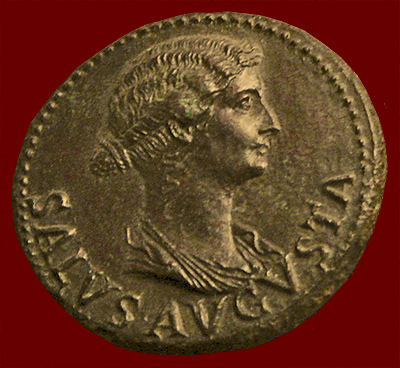 SALVS AVGVSTA: Livia on a dupondius of Tiberius, 22-23 CE |
Born Livia Drusilla in 58 BCE, she brought together in her person two old and powerful families: her father was Marcus Livius Drusus Claudianus (son of the patrician Claudii and adopted into the Livii). When she married Octavian in 38 BCE, with whom she lived in public harmony for 50 years, and was adopted by him in his will in 14 CE as Julia Augusta, she and thus her sons became members of the reigning gens Julia. While Tacitus opens his history with hostile references to Livia's role in the imperial succession (see Annales I.3), he presents her here, at her death in 29 CE, in a more favorable light as materfamilias and perfugium from Tiberius and his evil Prefect Sejanus. Book V opens with a brief review of her eventful life: her first marriage to Tiberius Claudius Nero, her divorce and hasty marriage to Octavian (his first wife Scribonia had just delivered their only child Julia) on the eve of her delivery of her second son Drusus, her failure to produce children with Augustus, her carefully managed public image as wife and mother, and finally the curtailed funeral rites permitted by her eldest son, for whom she secured Augustus' mantle in 14 CE, the Emperor Tiberius (42 BCE-37 CE). Having retreated from her influence to Capri in 26 CE, he avoided his mother for the rest of her life. Her teenage great grandson Caligula (Emperor 37-41 CE) pronounced her eulogy, later carrying out her will; in 42 CE her grandson Claudius (Emperor 41-54 CE) consecrated her Diva Augusta. For further images see McManus's Livia and Coins. |
| Chapter 1 | |
| (1) Rubellio et Fufio consulibus . . . Iulia Augusta mortem obiit, aetate extrema, nobilitatis per Claudiam familiam et adoptione Liviorum Iuliorumque clarissimae. | |
| (2) primum ei matrimonium et liberi fuere cum Tiberio Nerone . . . . | |
| (3) exim Caesar cupidine formae aufert marito, incertum an invitam, adeo properus ut, ne spatio quidem ad enitendum dato, penatibus suis gravidam induxerit. | |
| (4) nullam posthac subolem edidit, sed sanguini Augusti per coniunctionem Agrippinae et Germanici adnexa communes pronepotes habuit. | |
| (5) sanctitate domus priscum ad morem, comis ultra quam antiquis feminis probatum, mater inpotens, uxor facilis et cum artibus mariti, simulatione filii bene composita. | |
| (6) funus eius modicum, testamentum diu inritum fuit. laudata est pro rostris a Gaio Caesare pronepote, qui mox rerum potitus est. | |
| Chapter 2 | |
| (1) At Tiberius, quod supremis in matrem officiis defuisset . . . magnitudinem negotiorum per litteras excusavit, honoresque memoriae eius ab senatu large decretos quasi per modestiam imminuit, paucis admodum receptis et addito ne caelestis religio decerneretur: sic ipsam maluisse. | |
| (2) quin et parte eiusdem epistulae increpuit amicitias muliebres. . . . | |
| Chapter 3 | |
| (1) Ceterum ex eo praerupta iam et urguens dominatio; nam incolumi Augusta erat adhuc perfugium, quia Tiberio inveteratum erga matrem obsequium . . . . | |
Click on the underlined words for translation aids and
commentary, which will appear in a small window. Close the small window after
each use. Click on the icon link
![]() to the right of the
text for related images and information.
to the right of the
text for related images and information.